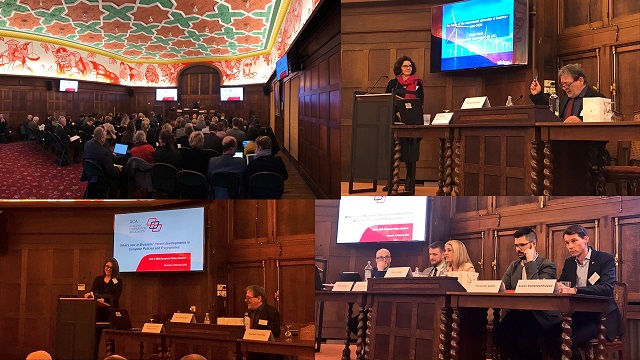ACA’s first European Policy Seminar (EPS) of 2018 took place on 9 February and it was a success, with more than 90 participants convening in Brussels to get first-hand information and share thoughts and ideas about the most recent and future developments in European policies and programmes. The speakers from the European Commission, national governments, higher education institutions and university networks put forward ideas and information as food for thought to all those who have an interest in what will happen in the world of (higher) education in Europe in the upcoming months and years.
The European Education Area 2025, envisaged as an area of much broader cross-border and cross-sectoral mobility experience than nowadays, will be linked to the European Higher Education Area (EHEA), but with an agenda at EU level only. This is considered a necessary measure due to the fact that some EU members of EHEA want to advance at a faster pace than currently possible within the EHEA. The Commission will work for a full development of the EU student card, a long-awaited magic tool meant to enable better transfer of data and therefore ease mobility.
Part of the same package, the proposal on 20 European universities is “on the table” and being defined by the Commission and other stakeholder organisations. There has seemingly been a change of the initial discourse towards creating 20 networks of European universities by 2024. Making sure not to repeat what already exists, these networks would foster cooperation in education and research between universities, allowing students to pick courses à la carte from any of these universities and get one single degree at the end of their studies, with automatic recognition. Such higher education oases would be supported by Erasmus+ and Horizon2020 (and their respective successors) as well as by the national level. The tentative timeline for the launch of the Pilot project is 2018-2020. It is suspected that the funding for such networks would make part of the KA2 of Erasmus+ post-2020.
As for the future Erasmus+ budget in the Multiannual Financial Framework, DG EAC unsurprisingly aims to an increase it (ideally 3% of the total budget vs. the current 1.4%). As indicated, the current three key actions in Erasmus+ will be maintained, with some simplification and re-balancing in the budget in order to decrease the administrative burden, make the programme more inclusive, and make better use of digital applications (Erasmus without papers, Erasmus+ app, etc). Higher education will not receive less, as some stakeholders fear based on the indications in the mid-term evaluation report, but the focus might be stronger on other sectors (such as VET or youth), where bigger impact is needed.
Knowing that Horizon2020 is – just like Erasmus+ – oversubscribed, with a success rate of around 11%, the increase in the budget post-2020 is a likely and very much desired scenario for the 9th Framework Programme. The same applies for Marie-Sklodowska Curie Actions (MSCA), part of Horizon2020, which support excellent science through mobility of young and experienced researchers. One of the novelties in MSCA 2018-2020 is additional financial support to enable participation and mobility of researchers with disabilities.
In sum, What’s new in Brussels? brought quite some news as promised and announced a number of upcoming initiatives relevant for the education and training community. The Commission’s ambitions seem high and welcomed by the HE community. The months of May and June will bring three new Commission’s recommendations as well as the proposed budget allocation and the proposals for the new programmes.
